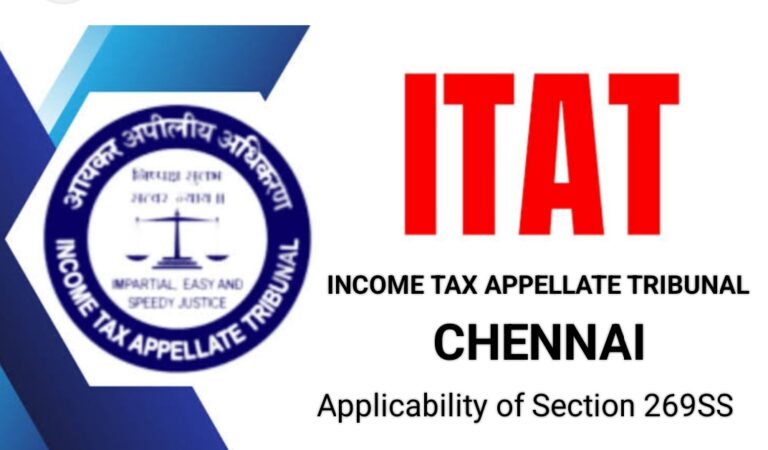This landmark ruling reinforces the principle that intermediaries operating in a fiduciary capacity are distinct from the principal parties in transactions. It sets a strong precedent for brokers, real estate facilitators, and agents, protecting them from undue penalties under Section 269SS.
Verdict of ITAT Chennai on Applicability of Section 269SS to Brokers & Intermidiaries acting in a fiduciary capacity: The Income Tax Appellate Tribunal (ITAT) Chennai, in the case of R. Anbuvelrajan vs. ACIT (ITA Nos. 2165 & 2166/Chny/2024), clarified the applicability of Section 269SS of the Income Tax Act to brokers acting as intermediaries in land transactions. This ruling provides significant relief to land aggregators and brokers by confirming that they cannot be penalized under Section 269SS for receiving cash payments as part of their facilitation role.
Understanding Section 269SS
Section 269SS of the Income Tax Act restricts the acceptance of loans, deposits, or specified sums exceeding ₹20,000 in cash. This provision aims to curb unaccounted transactions and promote financial transparency. However, exceptions exist for fiduciaries who act on behalf of principals without personal gain.
Also Read: Section 269SS of Income Tax Act- Penalty provisions & Scope of Appeal- Detailed
Key Findings of the ITAT Chennai Ruling
1. Broker’s Role as a Facilitator
The tribunal analyzed whether a land aggregator, acting as a broker, could be penalized under Section 269SS for cash transactions. It ruled that brokers do not receive the “specified sum” in their own right, as they merely facilitate payments between buyers and sellers.
2. Clarification on the Definition of ‘Specified Sum’
According to the tribunal, the term “specified sum” under Section 269SS pertains to money received in connection with the transfer of immovable property. Typically, this applies to payments made directly between buyers and sellers, not intermediaries.
3. Absence of Personal Gain
The tribunal emphasized that liability under Section 269SS applies only to parties who own or directly benefit from the transaction. Since the broker was merely an intermediary and did not retain the funds, the penalty imposed under Section 271D was deemed unwarranted.
4. Judicial Precedents and Legal Interpretations
The tribunal referred to Section 226 of the Indian Contract Act, which states that actions performed by an agent are attributed to the principal. This principle establishes that liabilities arising from contractual transactions rest with the principal parties, not intermediaries.
5. Review of the Memorandum of Understanding (MoU)
The tribunal examined the MoU between the parties, which outlined the broker’s responsibilities—identifying land parcels, negotiating terms, and facilitating transactions. Since the broker did not have ownership over the payments, they could not be held accountable under Section 269SS.
Also Read: Restrictions on Cash Transactions under Income Tax Act
Implications of the Ruling
This landmark ruling reinforces the principle that intermediaries operating in a fiduciary capacity are distinct from the principal parties in transactions. It sets a strong precedent for brokers, real estate facilitators, and agents, protecting them from undue penalties under Section 269SS. Businesses engaged in intermediary services can take reassurance from this judgment, ensuring compliance with tax laws while continuing their role as facilitators without the fear of legal repercussions.
Conclusion
The ITAT Chennai’s decision in R. Anbuvelrajan vs. ACIT clarifies that brokers and facilitators are not subject to penalties under Section 269SS, as they do not personally benefit from transactions. This verdict provides much-needed clarity on tax compliance for intermediaries in real estate and other industries reliant on facilitation services.
For professionals in brokerage services, this judgment serves as a vital reference, ensuring they are not wrongfully penalized for their intermediary role in financial transactions.
READ MORE
Marginal Relief vs. Rebate Under Section 87A of the Income Tax Act, 1961
GST SCN Leading to Dual Jurisdiction Conflict: How to Respond
